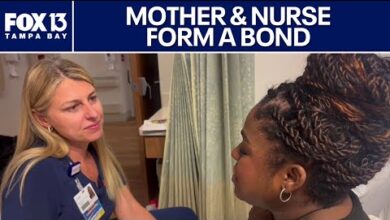Thirlwall Inquiry: Questions over delays in referring Letby to NMC

Former Nursing and Midwifery Council (NMC) boss Andrea Sutcliffe has told an inquiry the threshold used to decide whether to take regulatory action against serial killer Lucy Letby was “too high a bar”.
The Thirlwall Inquiry, which is investigating the circumstances surrounding the murder of seven babies and attempted murder of seven babies by then-neonatal nurse Lucy Letby, formally opened on Tuesday.
“The inquiry will be looking at the seemingly high threshold of referral, and if this is indicative of insufficient safeguarding of children”
Nicholas de la Poer
On the first day of the inquiry, counsel to the inquiry Rachel Langdale described the apparent missed opportunities to stop Letby, warnings by consultants that were ignored, as well as the differing opinions between medical and nursing staff, with some of the latter wanting Letby to remain in post when concerns about her were first raised.
The second day of the inquiry saw the counsel to the inquiry, Nicholas de la Poer KC, deliver his opening statements, which focused on issues of risk management, governance, regulation, referrals and the events leading up to Letby’s arrest.
As part of this, Mr de la Poer described a “seemingly high threshold” by Countess of Chester NHS Foundation Trust for deciding to refer Letby, who is serving life in prison for her crimes, to regulators and safeguarding organisations.
This, he said, will be looked at throughout the inquiry, in particular the length of time the NMC took to take action against Letby, and for a referral to be made to the regulator in the first place.
Letby was arrested by the police in July 2018 and charged in November 2020. The decision to strike her off the register was only made in December 2023, following her conviction.
The inquiry heard how the former neonatal nurse remained able to practise without restrictions until when she was charged – years after serious concerns were raised about her within Countess of Chester.
Part of the reason for this, Mr de la Poer said, may have been a hesitation by staff, including the trust’s former nursing director, Alison Kelly, to refer Letby.
Ms Kelly, the inquiry heard, had spoken positively about Letby to the NMC as late as May 2017, when she advised a member of the regulator of her “very good professional history” and “high credibility”.

Lucy Letby was arrested in 2018
“Without a referral, the NMC were not in a position to, and did not, commence an investigation, obtain disclosure or consider whether any interim measures were needed,” Mr de la Poer said.
“The inquiry will be looking at the seemingly high threshold of referral, and if this is indicative of insufficient safeguarding of children.”
He said that the NMC considered the lack of a criminal charge – by 2017 – against Letby to be a “hurdle” in obtaining an interim suspension order, and that by the middle of 2019, no formal attempts by the regulator had been made to request documents linking Letby to the deaths from the trust.
He quoted former NMC chief executive Andrea Sutcliffe, who said that the impression “may have been given” that evidence of deliberate endangerment had to be found before taking action, and that this was “too high a bar”.
She acknowledged that the regulator could have provided “better critical scrutiny” in supporting Ms Kelly in making a referral.
Ms Kelly, whose scepticism about the concerns raised by the paediatric consultants about Letby was spoken about at length by Mr de la Poer, was herself referred to the NMC in May 2020 by a group of consultants. At the time of the hearing, she remained under investigation.
Mr de la Poer also spoke about the Countess of Chester’s internal reporting systems and suggested this would form an important part of the inquiry.
He painted a picture of a structure designed to catch worries about issues, such as an increase in infant mortality in the neonatal ward, which had completely broken down.
At Countess of Chester, a concern about an individual, or a trend, was at the time of Letby’s murders supposed to be “funnelled” through first low-level committees featuring senior clinicians.
This would then be passed up to a divisional board, then to board committees – on which some of the most senior trust figures sat – before coming to the trust’s council of governance, before being heard within a meeting of the board itself.
However, Mr de la Power stated that this structure had failed in the case of the excess neonatal deaths at Countess of Chester.
He said: “[Concerns should have] been identified first by the neonatal incident review group, then raised at the women’s and children’s care governance board, which would then be referred to the quality, safety and patient experience committee, and eventually appear before the board. That is not what happened.
“Indeed, one of the apparent features of the concerns about Letby is how they were raised outside these established processes and structures, aside from the meetings of the executive director groups, the increase about neonatal mortality were rarely discussed.”
Mr de la Power then described the chronology of the events leading to Letby’s arrest, which saw huge delays and hesitance in reporting her to regulators and the police.
At one stage, a board member described the allegations about Letby as “unsubstantiated” and said the grievance procedure had “exonerated” her, with the board later moving to – although she never was – reinstate her to the ward.
The inquiry counsel said evidence sessions would also see the role of non-executive directors in the trust analysed, and questioned why they did not firmly question the board on its decisions in dealing with concerns raised about Letby in 2016 and 2017, both internally and with external organisations like the NMC.
Mr de la Power said: “While it is right the inquiry discusses collectively all of these committees operated how they did… [it] will be relentless about what [individual members] knew, what they should have known, what they said and what they didn’t say. And when all of that is established – why.”

Countess of Chester Hospital, where Lucy Letby worked
The inquiry counsel, in his opening statements, also quoted evidence from risk midwife Annemarie Lawrence, who said in May 2016 she noted that Letby was a “common factor in the case of most deaths” on the ward.
However, when Ms Lawrence raised this with Ruth Millward, head of risk and safety at the trust, she was “dismissive of her findings” and that these concerns had already been “looked at”.
Closing the day’s session was Rachel Langdale KC, another counsel to the inquiry.
She said the Thirlwall inquiry “does not exist in isolation”, and said it comes on the back of more than 30 similar investigations into healthcare over the last few decades.
Ms Langdale said they have all observed findings of substantial harm and failures in healthcare settings, but that recommendations have not always been taken on in full.
She outlined who will be giving evidence, what the key themes of the inquiry will be and spoke about potential recommendations that may be given at the end.
These included improved CCTV, better data collection, reporting systems and the regulation of senior managers in the NHS.
She finished: “Does the culture of the NHS need to change, and if so how?
“These questions and many more will be addressed in the evidence… The answers are important to all of those who work in the NHS and all of us who use its services.”
The inquiry will, for the rest of this week, hear from the core participants who include representatives of families, Countess of Chester, the NMC and the RCN.







